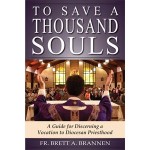 In To Save a Thousand Souls: Discerning a Vocation to Diocesan Priesthood (Vianney Vocations, 2010), Fr. Brett Bannon devotes an entire chapter to the characteristics of a good candidate for priesthood. He identifies 20 “signs” of a possible vocation to diocesan priesthood, since that is the focus of the book. However, I think these particular signs could also point to a vocation to the priesthood as a member of a religious community.
In To Save a Thousand Souls: Discerning a Vocation to Diocesan Priesthood (Vianney Vocations, 2010), Fr. Brett Bannon devotes an entire chapter to the characteristics of a good candidate for priesthood. He identifies 20 “signs” of a possible vocation to diocesan priesthood, since that is the focus of the book. However, I think these particular signs could also point to a vocation to the priesthood as a member of a religious community.
Fr. Brannen, an experienced vocation director and vice-rector of Mount St. Mary’s Seminary, gives two important caveats before diving into his list of signs.
First, the Lord can call anyone to serve as a priest. A potential candidate may not initially have all the qualities listed here, and that’s okay.
Second, the discernment of a priestly vocation should be a deliberate process involving one’s spiritual director, vocation director, and other sound spiritual guides.
According to Fr. Brannen, a good candidate for priesthood should . . .
(1) Know and love Jesus Christ and experience a thirst to bring Jesus and His teachings to the world.
(2) Be a believing, practicing Catholic.
(3) Be striving to live a life of prayer.
(4) Live and desire a life of service to others.
(5) Have a desire to be a priest.
(6) In many cases, have his call validated by other people.
(7) Find his calling validated in Sacred Scripture.
(8) Be striving to live a virtuous life.
(9) Have good people skills.
(10) Have above-average intelligence (but those who struggle academically should not lose heart!).
(11) Be physically, emotionally, and psychologically stable.
(12) Be joyful and have a good sense of humor.
(13) Have a “priest’s heart.”
(14) Have self-possession and self-mastery.
(15) Show stability in lifestyle.
(16) Be a Christian gentleman.
(17) Have life experiences that point toward priesthood.
(18) Be able to accept both success and failure peacefully.
(19) Have a healthy psycho-sexual development and orientation.
(20) Be truly open to the will of God for his life.
For an explanation of each of these possible signs, see pages 77-108 of Fr. Brannen’s excellent vocation resource.
Like this:
Like Loading...
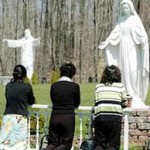 A discernment retreat is a prayerful visit with a religious community, perhaps for a weekend or even a week. Such a retreat is a good way to test your vocation. You can get to know the community and its charism, and consider whether God may be calling you to its way of life. Many communities hold retreats for groups for just this purpose. Or you may be able to visit them as an individual.
A discernment retreat is a prayerful visit with a religious community, perhaps for a weekend or even a week. Such a retreat is a good way to test your vocation. You can get to know the community and its charism, and consider whether God may be calling you to its way of life. Many communities hold retreats for groups for just this purpose. Or you may be able to visit them as an individual.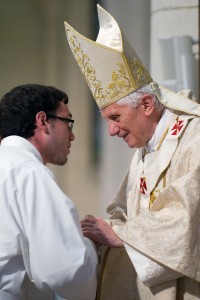

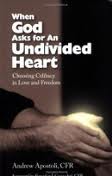 For those looking for answers to many practical questions about celibacy, we heartily recommend
For those looking for answers to many practical questions about celibacy, we heartily recommend 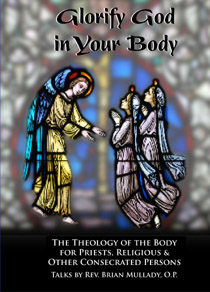 Blessed John Paul II has given the Church a great gift in his profound teaching on the theology of the body. The Holy Father emphasized that traditional Catholic teaching on marriage and the family is not in any sense rooted in a contempt for matter or for the body, but on the Incarnate love of the Trinity. This teaching not only helps us understand the Church’s teaching on hot-button issues such as divorce, contraception, and homosexulity, but also the gift of consecrated virginity or celibacy for the sake of the kingdom, as a complete gift of self to God.
Blessed John Paul II has given the Church a great gift in his profound teaching on the theology of the body. The Holy Father emphasized that traditional Catholic teaching on marriage and the family is not in any sense rooted in a contempt for matter or for the body, but on the Incarnate love of the Trinity. This teaching not only helps us understand the Church’s teaching on hot-button issues such as divorce, contraception, and homosexulity, but also the gift of consecrated virginity or celibacy for the sake of the kingdom, as a complete gift of self to God.  In
In